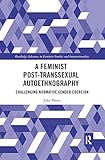A Feminist Post-transsexual Autoethnography : Challenging Normative Gender Coercion / by Julie Elizabeth Peters.
Material type: TextLanguage: English Series: Routledge Advances in Feminist Studies and Intersectionality: Publisher: Boca Raton, FL : Routledge, an imprint of Taylor and Francis, [2018]Copyright date: ©2019Edition: 1st editionDescription: 1 online resource (261 pages) : 42 illustrations, text file, PDFContent type: text Media type: computer Carrier type: online resourceISBN: 9781351212359Subject(s): SOCIAL SCIENCE / Sociology / General | Transexualism | Gender identity | FeminismGenre/Form: Electronic books.Additional physical formats: Print version: : No titleDDC classification: 305.3 LOC classification: HQ77.7 | .T738 2018Online resources: Click here to view. Also available in print format.
TextLanguage: English Series: Routledge Advances in Feminist Studies and Intersectionality: Publisher: Boca Raton, FL : Routledge, an imprint of Taylor and Francis, [2018]Copyright date: ©2019Edition: 1st editionDescription: 1 online resource (261 pages) : 42 illustrations, text file, PDFContent type: text Media type: computer Carrier type: online resourceISBN: 9781351212359Subject(s): SOCIAL SCIENCE / Sociology / General | Transexualism | Gender identity | FeminismGenre/Form: Electronic books.Additional physical formats: Print version: : No titleDDC classification: 305.3 LOC classification: HQ77.7 | .T738 2018Online resources: Click here to view. Also available in print format.Includes bibliographical references and index.
List of Tables -- List of Figures -- Acknowledgements -- Dedication -- Foreword -- 1 The Gendered Subject in the Social World -- 1.1 Research Themes and Structure of the Work -- 1.2 Methodological Overview -- 1.3 Ethical Considerations -- 1.4 The Exegesis Analysis and Interpretation -- --2 Critical Framing: Literature Review -- 2.1 Sociological Framing of Gendered Subject Formation -- 2.2 The Subject in the Social World -- 2.3 Competing/Intersecting Complexes of Power Constructing Gender -- 2.4 Trans and Gender-Diverse Health and Wellbeing -- 2.5 In Summary A Complex Intersectional Multidisciplinary Framing -- --3 Autoethnography I Peter -- 3.1 Ignorance is Bliss (1951-1958) -- 3.2 Realisations (1958-1962) -- 3.3 Secret Agency (1963-1965) -- 3.4 Puberty Rupture (1965) -- 3.5 My Dark Ages (1966-1971) -- --4 Autoethnography II Ghost -- 4.2 Grasping for Stability (1971-1973) -- 4.2 Transgression and Identity Quest (mid-1973-1990) -- --5 Autoethnography III Julie -- 5.1 Rebirth Transition Work (1990-1992) -- 5.2 The Art of Becoming Myself in a Gendered World -- --6 My Accommodation to the Social World -- 6.1 The Interplay between Desire and Normative Gender Coercion -- 6.2 Agency Grounded in a Transformation of Subjectivity -- 6.3 Agency Grounded in Restructuring Power Relations with Institutions -- 6.4 Political Recognition and Agency -- 6.5 Gendered Identity -- 6.6 Psychological Health -- 6.7 Gendered Embodiment, Habitus and Physical Health -- 6.8 Relationships, Intimacy, Sexuality and Livable Life -- 6.9 Aesthetic Appreciation and Achievement -- 6.10 Becoming Myself -- 7 The Subjects Explication of the Social World -- 7.1 Society Needs Coercion for Gender to be Performed Naturally -- 7.2 Individual, Ascribed Identity and Identity Politics -- 7.3 Disease Models of Gender Nonconformity -- 7.4 A Critique of Complexes of Power on Gender Nonconformity -- 7.5 The Radical Feminist Moral Critique of Transsexuality -- --8 Remaking the Social World -- 8.1 Strategies for Achieving the Necessities in Life -- 8.2 Strategies for a Healthy Life -- 8.2 Strategies for Achieving a Life with Agency -- 8.4 Strategies for Making Ones Life a Work of Art -- 8.5 The Realistic Possibility of Social Change -- --9 Synthesis and Conclusions -- 9.1 A Non-Pathological Schema on the Operation of Gender -- 9.2 Ensuing and Post-Doctoral Research Questions -- 9.3 The Major Themes Considered -- --Index.
Gender as a social class along with its concomitant heteronormative gender coercion seem to be intransigent across time and cultures. But across these cultures we also see a degree of nonconforming behaviour which very often carries significant multi-dimensions of stigma and risk; because the exception proves the rule, an understanding of gender nonconformity sheds light on the normative operation of gender in society. A Feminist Post-transsexual Autoethnography attempts to demythologise trans and gender diversity by conducting an in-depth critical analysis of the life choices of the autoethnographic subject (the author), who was so uncomfortable with their culturally allocated masculinity that they chose to live an apparently normal female life. The research is post-transsexual in that the subject forgoes passing in their affirmed gender to ensure the integrity of the data. A Feminist Post-transsexual Autoethnography may primarily appeal to students and researchers interested in the Sociology of Gender and Sociology of Trans and Gender Diversity, as well as the broader areas of embodiment and power differentials based on gender, class, nationality, location, temporality, sexuality and gender (non)conformity. This insightful volume may also be of interest to those within the fields Health Promotion and Education, Human Rights, Social Justice and Equity or the Social and Cultural Anthropology of Gender.
Also available in print format.

